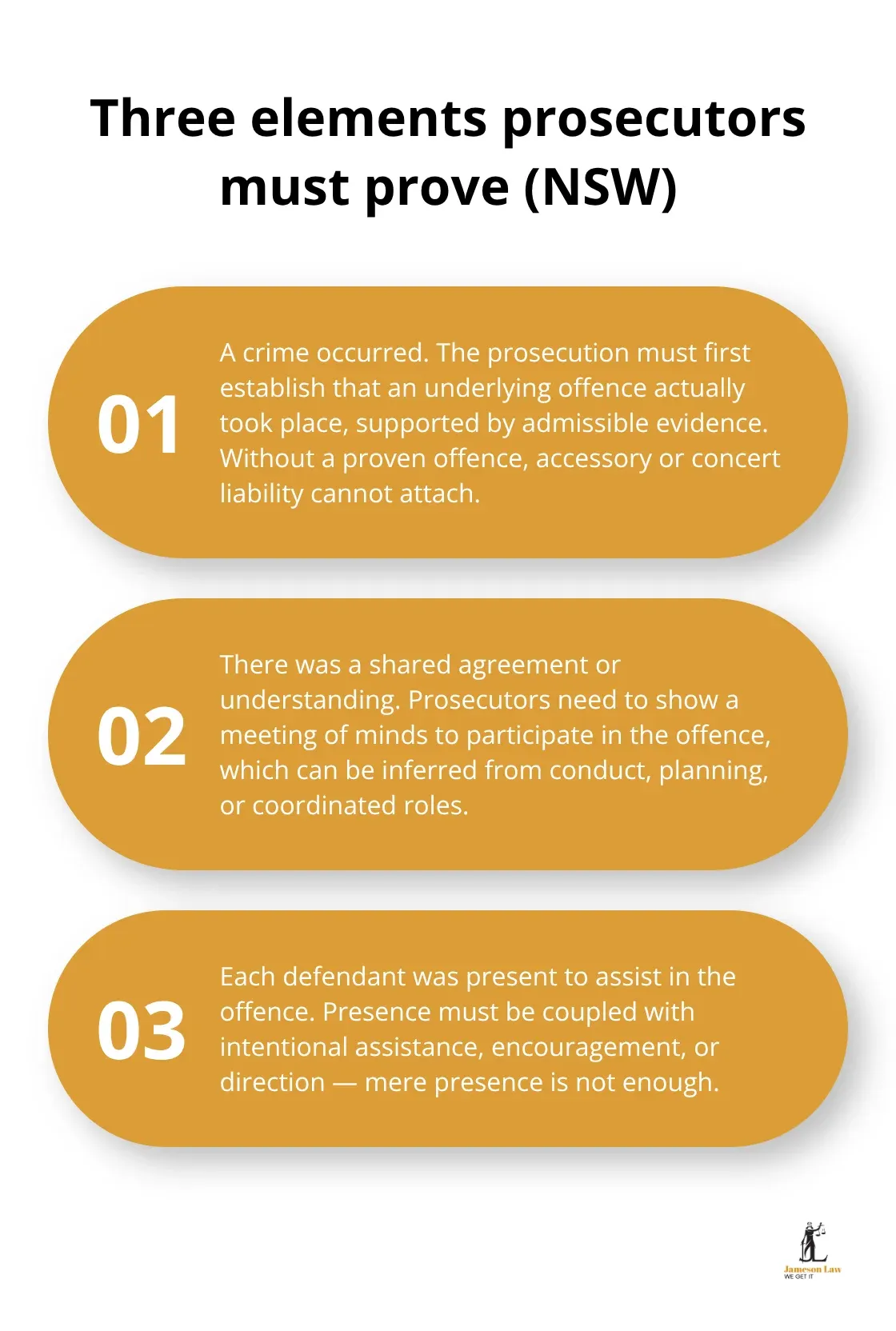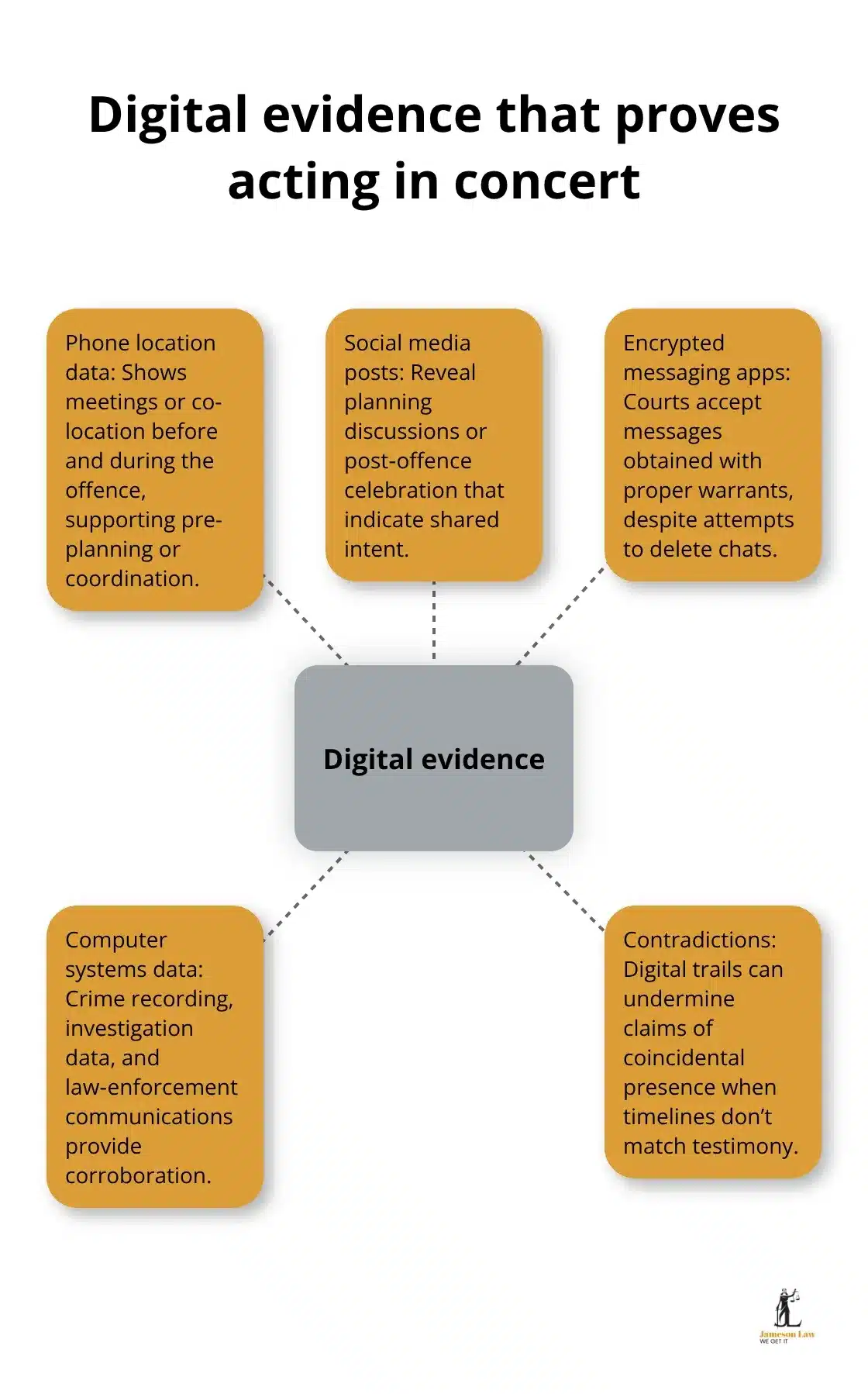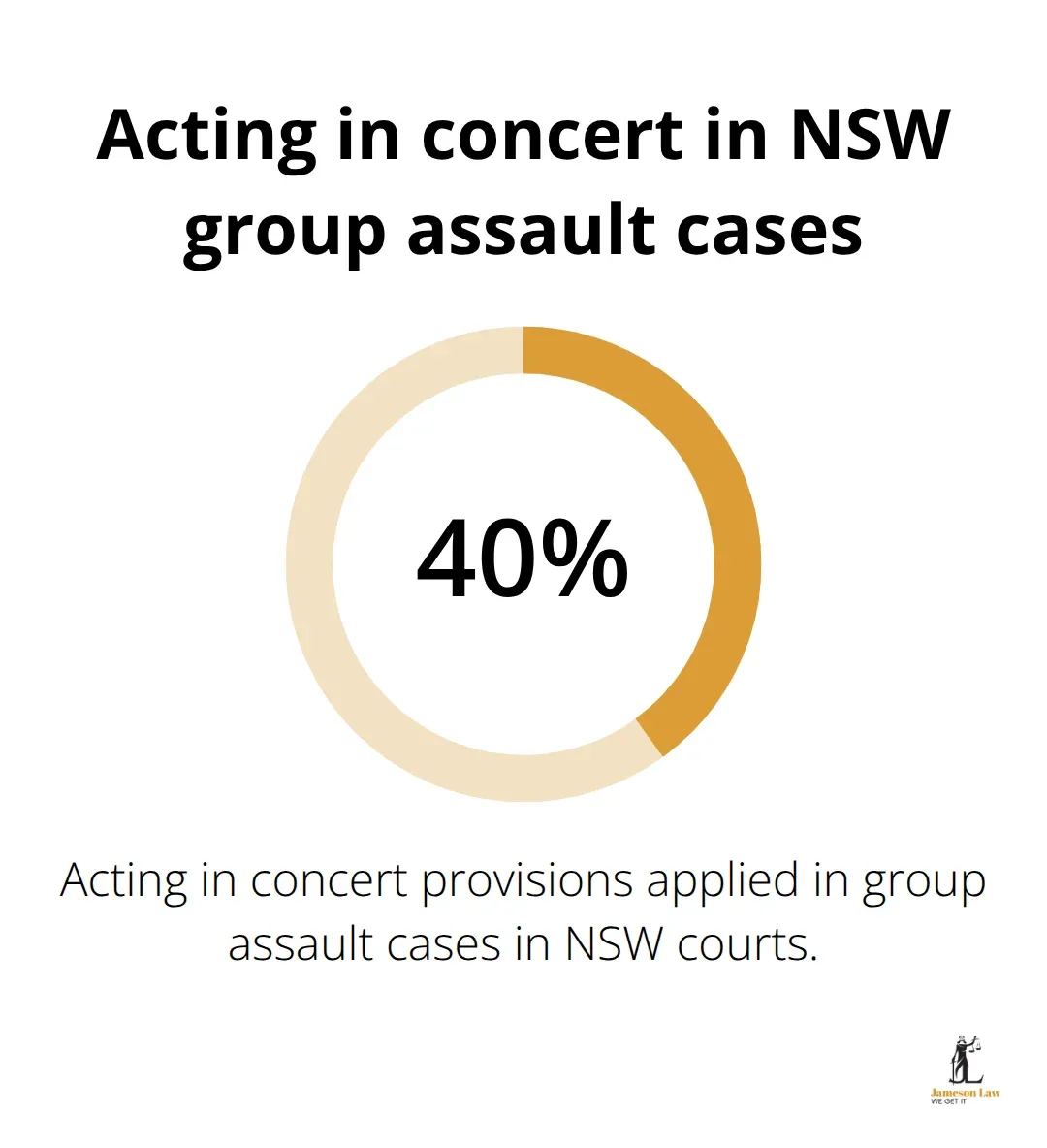Acting in concert criminal law holds multiple defendants accountable when they work together to commit crimes. This legal principle applies even when each person plays a different role in the offence.
We at Jameson Law see these cases regularly in NSW courts. Understanding how prosecutors prove joint criminal responsibility can make the difference between conviction and acquittal.
What Defines Acting in Concert Under NSW Law
Acting in concert occurs when two or more people participate in a crime through shared understanding or agreement. Prosecutors must prove three essential elements: a crime took place, an agreement existed between participants, and each defendant was present to assist in the offence.

NSW courts apply principles of joint criminal enterprise, which replaced earlier common law principles and establishes that participants face identical penalties to principal offenders. See also the Criminal Code framework at the Commonwealth level: Criminal Code Act 1995 (Cth).
Legal Requirements for Prosecution
Prosecutors face significant challenges when they prove these charges. They must demonstrate beyond reasonable doubt that defendants shared a common purpose at the time of the offence. Mere presence at the crime scene proves insufficient — courts require evidence of intentional assistance, encouragement, or direction. The O’Dea case established that constructive murder incorporates common law rules of attribution of acts embodied in joint criminal enterprise (this principle applies across Australian jurisdictions). NSW courts consistently rule that passive observation without active participation cannot establish guilt under these provisions. For court process basics, see NSW criminal court procedures.
Key Differences from Joint Criminal Enterprise
Acting in concert differs fundamentally from joint criminal enterprise in scope and application. Joint enterprise typically involves broader criminal activities where participants share responsibility for all foreseeable consequences of their agreement. Acting in concert focuses specifically on the immediate offence where defendants actively participated. The Commonwealth Criminal Code recognises that offenders who act in concert in the commission of an offence are parties to a joint criminal enterprise, while NSW provisions maintain distinct categories. This distinction matters significantly at sentencing, as defendants may face different penalties based on their specific level of participation rather than blanket joint responsibility. For sentencing guidance, see the Judicial Commission (Parties to crime).
Withdrawal from Criminal Agreement
Defendants can avoid liability if they withdraw from the agreement before the crime occurs. The withdrawal must be communicated clearly to all parties involved and happen in a timely manner (courts assess this based on specific circumstances). A simple change of mind or feelings of regret does not constitute effective withdrawal. The person must take reasonable steps to prevent the offence and issue what courts call a “timely countermand” to other participants. In cases involving drug-related crimes, defendants may also claim duress as a defence if they participated under threat or coercion. These cases demonstrate how complex criminal law becomes when multiple parties face charges for the same offence.
How Do Prosecutors Prove Acting in Concert
Prosecutors must present specific evidence to establish acting in concert charges in NSW courts. The evidence requirements go far beyond proof of individual participation — courts demand proof of shared understanding between defendants at the time of the offence. Text messages, phone records, and surveillance footage often provide the strongest evidence of pre-planning and coordination. NSW courts examine witness testimony carefully, particularly from co-offenders who agree to testify against former associates. For an outline of probative value of digital evidence, see the Judicial Commission – Evidence (digital).
Intent and Knowledge Requirements
The prosecution must prove defendants possessed specific intent to assist in the criminal activity, not merely awareness that a crime might occur. NSW courts distinguish between reckless presence and intentional participation — defendants who actively encourage violence through words or gestures face conviction, while those who simply fail to leave the scene may avoid liability. Knowledge requirements vary based on the offence type: robbery cases require proof that defendants understood the target and method, while assault cases focus on shared intent to cause harm. Prosecutors face challenges with proof of intent, particularly when defendants claim they attended only to prevent violence or retrieve property. If charged, get advice on court representation and sentencing advocacy.
Evidence of Agreement Without Direct Communication
Courts accept circumstantial evidence to establish agreements between defendants, particularly when direct communication evidence is unavailable. Synchronised movements, coordinated roles during the offence, and similar weapon choices can demonstrate shared planning. NSW prosecutors frequently rely on pattern evidence that shows defendants acted with unusual coordination or timing that suggests prior agreement. The prosecution standard requires proof beyond reasonable doubt, but courts allow juries to infer agreements from conduct that would be highly unlikely without prior planning. See crime data resources at BOCSAR.
Digital Evidence and Modern Prosecution Methods
Modern prosecution relies heavily on digital footprints to establish criminal agreements. Phone location data can prove defendants met before crimes occurred, while social media posts often reveal planning discussions or celebration after offences. Courts have accepted evidence from encrypted messaging apps when police obtain proper warrants. For police powers and warrants generally, see LEPRA 2002 (NSW). If police contact you, read what to do when police request to speak with you.

When Does Acting in Concert Apply in Real Cases
Group Assault and Violence Cases
Group assault cases represent the most common application of acting in concert charges in NSW courts. When multiple defendants participate in a fight, prosecutors examine each person’s role to determine shared responsibility. For sentencing and prevalence trends, consult BOCSAR publications.

Robbery Operations and Coordinated Theft
Robbery cases frequently involve acting in concert because these crimes require coordination between participants. Courts examine role distribution among defendants: lookouts, getaway drivers, and those who directly confront victims can face identical penalties under joint criminal enterprise principles. See national context at the Australian Institute of Criminology.
Drug Distribution Networks and Supply Chains
Drug-related criminal activities present complex acting in concert scenarios because participants often operate at different levels of the supply chain. NSW courts hold street-level dealers and suppliers equally responsible when evidence shows coordinated distribution efforts. For national drug threat assessments, see the Australian Criminal Intelligence Commission. If facing allegations, review our drug offences hub.
Final Thoughts
Acting in concert criminal law creates serious legal consequences for anyone involved in group criminal activities, regardless of their specific role. NSW courts hold all participants equally responsible when prosecutors prove shared understanding and intentional assistance in committing offences. The prosecution must establish three key elements: a crime occurred, defendants agreed to participate, and each person was present to assist.
Evidence requirements go beyond mere presence — courts demand proof of active encouragement, coordination, or assistance. Digital evidence, witness testimony, and circumstantial proof of planning often determine outcomes. Defendants can withdraw before the offence, but this requires timely, clear communication and reasonable steps to prevent the crime. For advice tailored to your situation, contact Jameson Law or call (02) 8806 0866. You can also reach us via contact.













